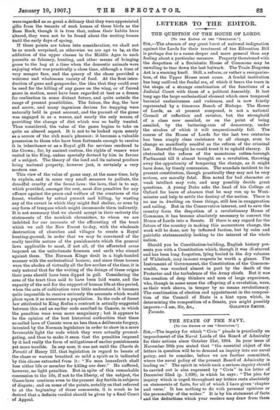LETTERS TO THE EDITOR.
THE QUESTION OF THE HOUSE OF LORDS.
MO TER EDITOR OD sae ..SPROI,TOR."1
SITE,—The absence of any great burst of national indignation against the Lords for their treatment of the Education Bill is perhaps due to a cause deeper and more general than any feeling about a particular measure. Property threatened with the despotism of a Socialistic House of Commons may be unwilling to tear down the last bulwark. The Trade Disputes Act is a warning knell. Still, a reform, or rather a reorganisa- tion, of the Upper House must come. A feudal institution has long outlived the feudal era, of which it bears the trace in the shape of a strange combination of the functions of a Judicial Court with those of a political Assembly. It lost long ago the large ecclesiastical element which once tempered baronial exclusiveness and rudeness, and is now faintly represented by a timorous Bench of Bishops. The House of Lords, as at present composed, is not a national Council of reflection and revision, but the stronghold of a class now assailed, or on the point of being assailed, by the battering-ram of democracy, under the strokes of which it will unquestionably fall. The course of the House of Lords for the last two centuries has been simply class resistance to all change, even to change so manifestly needful as the reform of the criminal law. Boswell thought he could trust it to uphold slavery. It obstructed the reform of the monstrous rotten-borough Parliament till it almost brought on a revolution, throwing away the opportunity of tempering the change, as it might have done, by timely concession. The scandals incident to its present constitution, though practically they may not be very serious, are morally fatal. Men noted for bad character or weak intellect may vote, and may possibly decide great questions. A young Duke asks the head of his College at Oxford for leave of absence that he may run up to West- minster and help to settle the destiny of the nation. There is no use in dwelling on these things, still lees in exaggeration and railing. But in the Conservative interest, and to save the country from the despotism of a ',evolutional,' House of Commons, it has become absolutely necessary to convert the House of Lords into a Senate. If there is any regard for the future of the country in making this momentous change, the work will be done, not by inflamed faction, but by calm and patriotic statesmanship looking to the interest of the whole nation.
Should you be Constitution-building, English history pre- sents you with a Constitution which, though it was ill-starred and has been long forgotten, lying buried in the dry volumes of Whitelock, may in some respects be worth a glance. The Instrument of Government, the Constitution of the Common- wealth, was wrecked almost in port by the death of tho Protector and the turbulence of the Army chiefs. But it was the creation of deep thinkers and men of large experience, who, though in some sense the offspring of a revolution, were, as their work shows, in temper by no means revolutionary. The combination of election and appointment in the composi- tion of the Council of State is a hint upon which, in determining the composition of a Senate, you might possibly






































 Previous page
Previous page